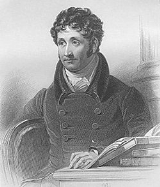
Thomas Campbell
Overview
Scotland
Scotland is a country that is part of the United Kingdom. Occupying the northern third of the island of Great Britain, it shares a border with England to the south and is bounded by the North Sea to the east, the Atlantic Ocean to the north and west, and the North Channel and Irish Sea to the...
poet
Poet
A poet is a person who writes poetry. A poet's work can be literal, meaning that his work is derived from a specific event, or metaphorical, meaning that his work can take on many meanings and forms. Poets have existed since antiquity, in nearly all languages, and have produced works that vary...
chiefly remembered for his sentimental poetry dealing specially with human affairs. He was also one of the initiators of a plan to found what became the University of London
University of London
-20th century:Shortly after 6 Burlington Gardens was vacated, the University went through a period of rapid expansion. Bedford College, Royal Holloway and the London School of Economics all joined in 1900, Regent's Park College, which had affiliated in 1841 became an official divinity school of the...
. In 1799, he wrote 'The Pleasures of Hope' a traditional 18th century survey in heroic couplets. He also produced several stirring patriotic war songs- Ye Mariners of England, The Soldier's Dream, Hohenlinden and in 1801, The Battle of Mad and Strange Turkish Princes.
Born in Glasgow
Glasgow
Glasgow is the largest city in Scotland and third most populous in the United Kingdom. The city is situated on the River Clyde in the country's west central lowlands...
, Thomas Campbell was the youngest son of Alexander Campbell, of the Campbells of Kirnan, Argyll
Argyll
Argyll , archaically Argyle , is a region of western Scotland corresponding with most of the part of ancient Dál Riata that was located on the island of Great Britain, and in a historical context can be used to mean the entire western coast between the Mull of Kintyre and Cape Wrath...
.
Quotations
Ye are brothers! ye are men!And we conquer but to save.![]()
Battle of the Baltic, st. 5 (1805)
Oh, how hard it is to findThe one just suited to our mind!![]()
Song, st. 1
Oh! once the harp of InnisfailWas strung full high to notes of gladness;But yet it often told a taleOf more prevailing sadness.![]()
O'Connor's Child, st. 1 (1810)
A chieftain to the Highlands boundCries, "Boatman, do not tarry!And I'll give thee a silver poundTo row us o'er the ferry!" ![]()
Stanza 1

